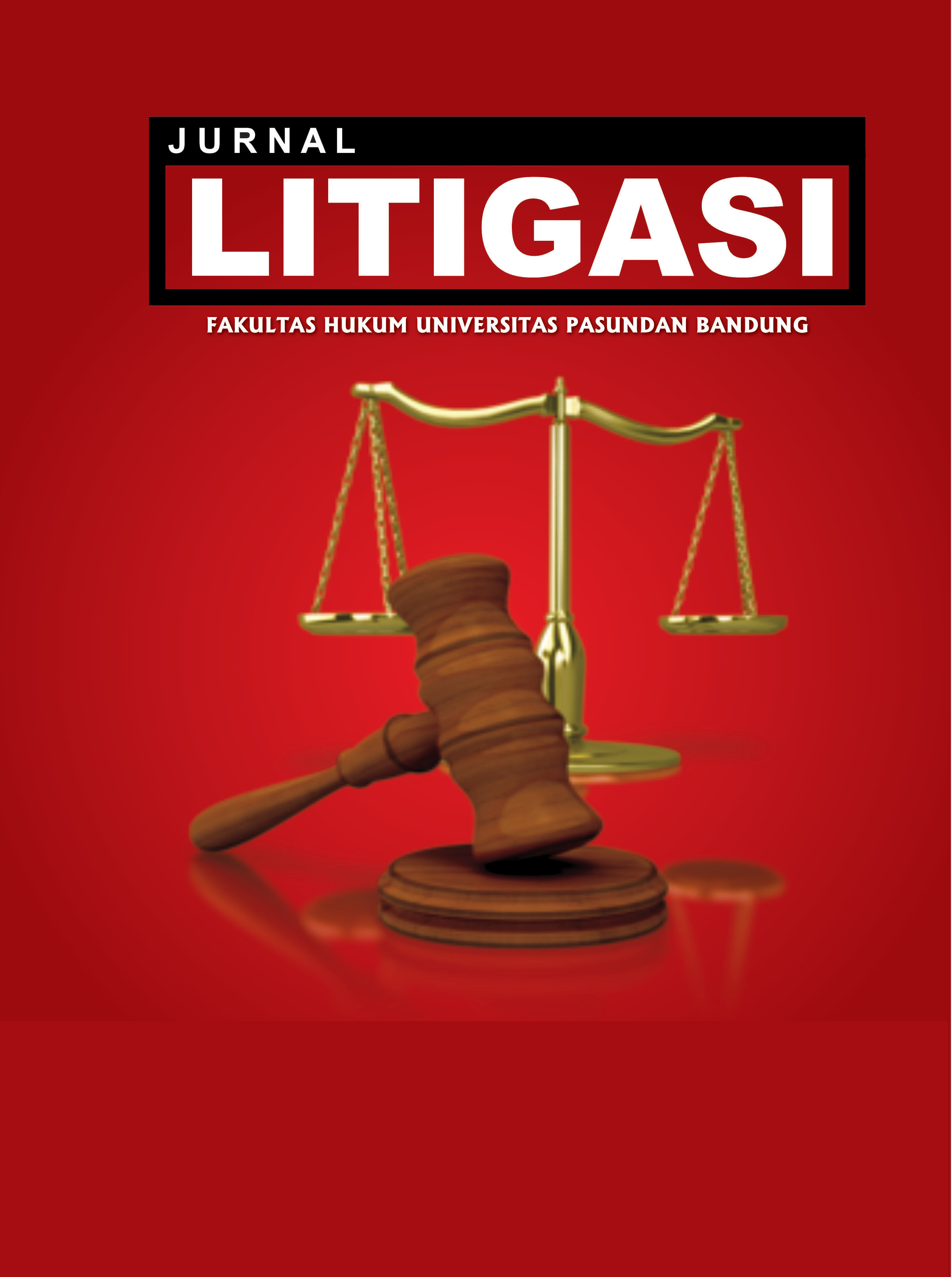REGIONAL VICE HEADS: POWER PLAYERS OR MERE PUPPETS? UNPACKING THE CONTRADICTIONS IN LAW NO. 23/2014
DOI:
https://doi.org/10.23969/litigasi.v25i2.14574Keywords:
Deputy Regional Head, Local Government, Principle Based AuthorizationAbstract
The role of the deputy regional head in Indonesia is primarily intended to complement the regional head by assisting in the execution of governmental duties. However, the ambiguity surrounding the deputy’s authority has emerged as a critical issue, often resulting in disharmony between regional heads and their deputies. If left unresolved, this tension may disrupt regional governance and prompt considerations of abolishing the deputy regional head position altogether. This study employs a normative juridical approach, analyzing secondary data through qualitative juridical methods to produce a descriptive narrative. The findings reveal that the regional head’s authority frequently overshadows the deputy’s role, rendering the deputy regional head largely symbolic and ineffective. This power imbalance has been a recurring source of conflict. To address this, the study proposes a Principle-Based Authorization Model to clearly define and strengthen the deputy’s authority, ensuring a more balanced and harmonious relationship. The urgency of this issue necessitates action from both the government and parliament to revise Law No. 23 of 2014 on Regional Government or to introduce specific regulations delineating the deputy’s responsibilities. By empowering the deputy regional head’s role, this reform could enhance the efficiency and effectiveness of regional governance, contributing to more stable and cooperative leadership at the regional level.
Downloads
References
Abikusna, R. A. (2019). Kewenangan Pemerintah Daerah Dalam Perspektif Undang-Undang Nomor 23 Tahun 2014 Tentang Pemerintahan Daerah. SOSFILKOM : Jurnal Sosial, Filsafat dan Komunikasi, 13(01), 1–15. https://doi.org/10.32534/jsfk.v13i01.1453
Adiyanta, F. C. S. (2019). Pembaruan Hukum Nasional: Pruralisme, Unifikasi Hukum, dan Hubungan Kewenangan antara Pemerintah Pusat dengan Pemerintah Daerah. Administrative Law and Governance Journal, 2(1), 93–105. https://doi.org/10.14710/alj.v2i1.93-105
Asshiddiqie, J. (2007). Pokok-pokok hukum tata negara Indonesia pasca reformasi. Bhuana Ilmu Populer.
Bait, P. M., & Neonbeni, R. V. (2022). Kedudukan Wakil Kepala Daerah Dalam Sistem Pemerintahan Daerah Indonesia. Saraq Opat: Jurnal Administrasi Publik, 4(2), 109–114. https://doi.org/10.55542/saraqopat.v4i2.318
Fauzi, A. (2019). Otonomi Daerah Dalam Kerangka Mewujudkan Penyelenggaraan Pemerintahan Daerah Yang Baik. SPEKTRUM HUKUM, 16(1), 119. https://doi.org/10.35973/sh.v16i1.1130
Hariansah, S., & Agustian, R. A. (2022). Ambiguitas dan Inkonsistensi Kedudukan serta Kewenangan Wakil Kepala Daerah dalam Sistem Pemerintahan Daerah. PROGRESIF: Jurnal Hukum, 16(1), 114–129. https://doi.org/10.33019/progresif.v16i1.2849
Hariyanto, H. (2020). Hubungan Kewenangan antara Pemerintah Pusat dan Pemerintah Daerah Berdasarkan Negara Kesatuan Republik Indonesia. Volksgeist: Jurnal Ilmu Hukum dan Konstitusi, 3(2), 99–115. https://doi.org/10.24090/volksgeist.v3i2.4184
Hsb, A. M. (2019). Pelaksanaan Kewenangan Atribusi Pemerintahan Daerah Berdasarkan Undang-Undang Nomor 23 Tahun 2014 tentang Pemerintahan Daerah. https://doi.org/10.31219/osf.io/utw97
Kariadi, K. (2020). Kekuasaan Kehakiman Dalam Undang-Undang Dasar Negara Republik Indonesia Tahun 1945 “Saat Ini Dan Esok.” JUSTISI, 6(2), 99–110. https://doi.org/10.33506/js.v6i2.971
Kelibay, I., Boinauw, I., Rosnani, R., & Kalagison, M. D. (2022). Dinamika Pemilihan Kepala Daerah Serentak Nasional Dalam Pemilihan Umum Tahun 2024. Jurnal Noken: Ilmu-Ilmu Sosial, 7(2), 167–181. https://doi.org/10.33506/jn.v7i2.1739
Labolo, M. (2022). Disfungsi Peran Wakil Kepala Daerah Dalam Dinamika Hubungan Kepala Daerah Dan Wakil Kepala Daerah Di Indonesia. Jurnal Keadilan Pemilu, 1(3), 29–42. https://doi.org/10.55108/jkp.v1i3.160
Risal, R., & Munawir, L. O. (2021). Pembagian Kewenangan Kepala Daerah Dan Wakil Kepala Daerah Dalam Penyelenggaraan Pemerintahan. Legal Standing : Jurnal Ilmu Hukum, 5(2), 71. https://doi.org/10.24269/ls.v5i2.3818
Sarbaini, S. (2020). Penyelenggaraan Pemilihan Kepala Daerah Secara Langsung dan Demokratis Sebagai Bentuk Perwujudan Hak Asasi Politik Masyarakat di Indonesia. Legalitas: Jurnal Hukum, 12(1), 107. https://doi.org/10.33087/legalitas.v12i1.197
Sommaliagustina, D. (2019). Implementasi Otonomi Daerah dan Korupsi Kepala Daerah. Journal of Governance Innovation, 1(1), 44–58. https://doi.org/10.36636/jogiv.v1i1.290
Sufianto, D. (2020). Pasang Surut Otonomi Daerah Di Indonesia. Jurnal Academia Praja, 3(2), 271–288. https://doi.org/10.36859/jap.v3i2.185
Umar, J. (2021). Kewenangan Otonomi Daerah: Sistem Pertanahan Daerah Istimewa Yogyakarta. Cerdika: Jurnal Ilmiah Indonesia, 1(2), 97–102. https://doi.org/10.36418/cerdika.v1i2.27
Yanti, Y., & Johan Nasution, B. (2021). Fungsi Wakil Kepala Daerah Dalam Menyelenggarakan Pemerintahan Daerah Berdasarkan Undang-Undang Nomor 23 Tahun 2014 Tentang Pemerintahan Daerah. Limbago: Journal of Constitutional Law, 1(2), 325–345. https://doi.org/10.22437/limbago.v1i2.13388
Downloads
Submitted
Accepted
Published
How to Cite
Issue
Section
License
Copyright (c) 2024 Jurnal LITIGASI

This work is licensed under a Creative Commons Attribution-ShareAlike 4.0 International License.
Copyright © 2026 Jurnal LITIGASI (e-Journal).
Jurnal LITIGASI (e-Journal) adopts the CC-BY license as the optimal license for publishing, distributing, using, and reusing scholarly work. Authors who publish with this journal retain copyright and grant the journal right of first publication with the work simultaneously licensed under a Creative Commons Attribution 4.0 International License (CC-BY 4.0). This license allows others to share, copy, distribute, and adapt the work, provided that the work's authorship and initial publication in this journal are properly cited.






























